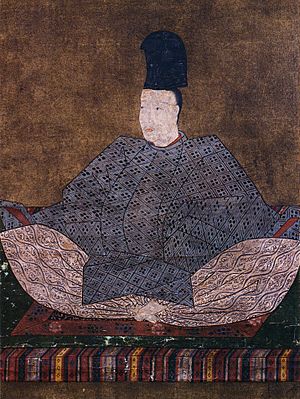Emperor Go-Hanazono facts for kids
Quick facts for kids Emperor Go-Hanazono後花園天皇 |
|||||
|---|---|---|---|---|---|
 |
|||||
| Emperor of Japan | |||||
| Reign | September 7, 1428 – August 21, 1464 | ||||
| Coronation | January 21, 1430 | ||||
| Predecessor | Shōkō | ||||
| Successor | Go-Tsuchimikado | ||||
| Shōgun | Ashikaga Yoshinori Ashikaga Yoshikatsu Ashikaga Yoshimasa |
||||
| Born | Hikohito (彦仁) July 10, 1418 |
||||
| Died | 18 January 1471 (aged 52) | ||||
| Burial | Nochi no Yamakuni no Misasagi (後山國陵) (Kyoto) | ||||
| Issue |
|
||||
|
|||||
| House | Yamato (Fushimi branch) | ||||
| Father | Prince Sadafusa | ||||
| Mother | Niwata Sachiko | ||||
| Signature |  |
||||
Emperor Go-Hanazono (後花園天皇, Go-Hanazono-tennō) (born July 10, 1418 – died January 18, 1471) was the 102nd emperor of Japan. He ruled from 1428 to 1464.
His name, Go-Hanazono, means "Later Emperor Hanazono." This is because he was named after an earlier Emperor Hanazono from the 14th century.
Contents
Becoming Emperor
Before he became emperor, his personal name was Hikohito. He was the oldest son of Prince Fushimi-no-miya Sadafusa. His mother was Sachiko.
Emperor Go-Hanazono was chosen to be emperor because the previous emperor, Emperor Shōkō, did not have any sons. To make sure the imperial family line continued, the retired Emperor Go-Komatsu adopted Hikohito. This made Hikohito the next in line for the throne.
His Family
Emperor Go-Hanazono had several children with his main consort, Ōinomikado Nobuko, and other ladies-in-waiting:
- Princess Kanshin (his first daughter)
- Imperial Prince Fusahito, who later became Emperor Go-Tsuchimikado
- Princess Shinjoji
- Princess Shogon
Important Events During His Reign
Emperor Go-Hanazono's time as ruler saw many important events in Japan.
- 1428: When Emperor Shōkō died at age 27, Hikohito became the new emperor. He was only 10 years old.
- 1429: Ashikaga Yoshinori became the new Shōgun. A Shōgun was a powerful military leader who often held more real power than the emperor in those days.
- 1433: The Emperor of China, the Xuande Emperor, sent a letter to Yoshinori, calling him the "King of Japan." This showed how important the Shōgun was seen, even by other countries.
- 1441: Shōgun Yoshinori was murdered. His 8-year-old son, Ashikaga Yoshikatsu, became the new Shōgun.
- 1442: Shōgun Yoshikatsu died at age 10 after falling from a horse. His 8-year-old brother, Yoshinari, then became Shōgun.
- 1443: A group of rebels broke into the palace. They started a fire and tried to harm Emperor Go-Hanazono, but he escaped. However, they stole the Three Sacred Treasures of Japan: a mirror, a sword, and a jewel. These treasures are very important symbols of the emperor's power.
- 1444: The stolen jewel was found and returned.
- 1451: People from the Ryukyu Islands (now part of Japan, south of the main islands) visited Kyoto for the first time.
- 1453: Shōgun Yoshinari changed his name to Ashikaga Yoshimasa.
- 1458: The Sacred Jewel, which had been stolen, was finally brought back to the palace.
- 1464: Emperor Go-Hanazono decided to step down from the throne. His son, Imperial Prince Fusahito, became the new emperor, Emperor Go-Tsuchimikado.
For a while, Emperor Go-Hanazono's uncle, the former Emperor Go-Komatsu, held most of the real power. This was a tradition called "cloistered rule," where a retired emperor still guided the country. After his uncle died in 1433, Go-Hanazono ruled directly for 30 years.
- January 18, 1471: Former Emperor Go-Hanazono died at age 52.
Eras During His Reign
In Japan, years are grouped into "eras" or nengō, which often change when a new emperor takes the throne or for other important reasons. Emperor Go-Hanazono's reign was quite long and included many different eras:
- Shōchō (1428–1429)
- Eikyō (1429–1441)
- Kakitsu (1441–1444)
- Bun'an (1444–1449)
- Hōtoku (1449–1452)
- Kyōtoku (1452–1455)
- Kōshō (1455–1457)
- Chōroku (1457–1460)
- Kanshō (1460–1466)
See also
 In Spanish: Go-Hanazono Tennō para niños
In Spanish: Go-Hanazono Tennō para niños
| Regnal titles | ||
|---|---|---|
| Preceded by Emperor Shōkō |
Emperor of Japan: Go-Hanozano 1428–1464 |
Succeeded by Emperor Go-Tsuchimikado |
 | Dorothy Vaughan |
 | Charles Henry Turner |
 | Hildrus Poindexter |
 | Henry Cecil McBay |

